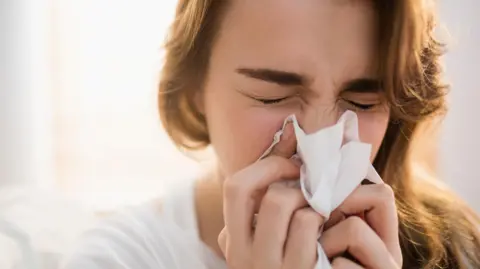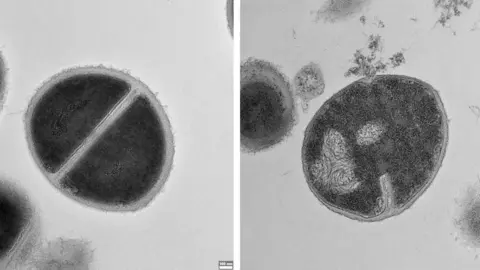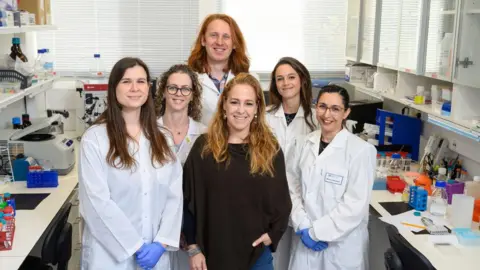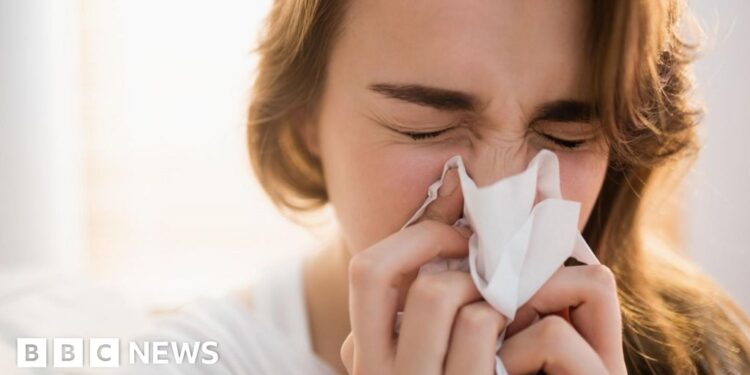[ad_1]
 Getty Images
Getty ImagesA new part of the immune system has been discovered and it is a goldmine of potential antibiotics, scientists have said.
They’ve shown a part of the body known to recycle proteins has a secret mode that can spew out an arsenal of bacteria-killing chemicals.
The researchers in Israel say it transforms our understanding of how we are protected against infection.
And gives a new place to look for antibiotics to tackle the growing problem of superbugs that resist our current drugs.
The discovery centres on the proteasome – a tiny structure that is found in every cell of the body.
Its main role is to chop up old proteins into smaller chunks so they can be recycled to make new ones.
But a series of experiments, detailed in the journal Nature, shows the proteasome detects when a cell has been infected by bacteria.
It then changes structure and role. It starts transforming old proteins into weapons that can rip open the outer layer of bacteria to kill them.
 Weizmann Institute of Science
Weizmann Institute of ScienceProf Yifat Merbl, from the Weizmann Institute of Science, told me: “This is really exciting, because we never knew that this was happening.
“We discovered a novel mechanism of immunity that is allowing us to have a defence against bacterial infection.
“It’s happening throughout our body in all the cells, and generates a whole new class of potential natural antibiotics.”
The research team went through a process they called “dumpster diving” to find these natural antibiotics.
They were tested on bacteria growing in the laboratory and on mice with pneumonia and sepsis. The researchers said they were getting results comparable to some established antibiotics.
And when the researchers took cells in the laboratory and disabled the proteasome they were far easier to infect with bacteria like Salmonella.
 Weizmann Institute of Science
Weizmann Institute of ScienceProf Daniel Davis, the head of life sciences and an immunologist at Imperial College London, said the findings were “extremely provocative and very interesting” as they changed our understanding of how our body fights infection.
“What’s really exciting about this, is it’s a totally undiscovered process by which anti-germ molecules are made inside our cells, it feels profoundly important and surprising.”
But he cautioned that turning this into a new source of antibiotics is an idea that “still needs to be tested” and that will take time.
More than a million people a year are estimated to die from infections that are resistant to drugs like antibiotics.
But despite the need, there has been a lack of research into developing new antibiotics to keep up with demand.
Against that bleak background, having somewhere new to look is a source of optimism for some scientists.
Dr Lindsey Edwards, a senior lecturer in microbiology at King’s College London, told the BBC: “It’s a potential goldmine for new antibiotics, that’s quite exciting.
“In previous years it’s been digging up soil [to find new antibiotics], it is wild that it’s something we have within us, but comes down to having the technology to be able to detect these things.”
She also says there could be fewer issues with developing them into drugs because they are already products of the human body so the “safety side of it might be a lot easier”.
[ad_2]
Source link : https://www.bbc.com/news/articles/cpv4jww3r4eo
Author :
Publish date : 2025-03-06 01:19:00
Copyright for syndicated content belongs to the linked Source.















